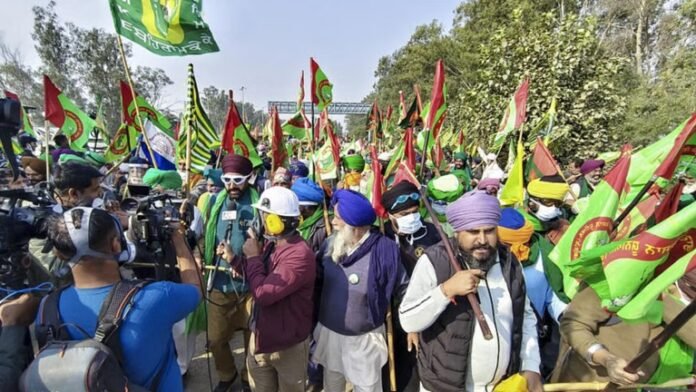Farmers and Punjab Police clashed in the early hours of Monday, leading to the detention of prominent farmer leader Jagjit Dallewal. The confrontation occurred near the outskirts of the city as farmers, who have been protesting against the government’s agricultural policies, were met with a heavy police presence. The Punjab Police demolished protest sites that had been erected as a symbol of resistance over the last few weeks, raising concerns over the state’s approach to handling public dissent.
The incident marks a significant turning point in the ongoing farmers’ movement, which has gained widespread attention not only in Punjab but across India. Farmers, especially those from the agrarian heartland of Punjab, have been protesting against laws they claim will erode their bargaining power with corporate buyers and lead to the dismantling of the Minimum Support Price (MSP) system. These laws, they argue, threaten their livelihoods and undermine the agricultural sector that forms the backbone of the state’s economy.
Jagjit Dallewal, a prominent leader from the Kisan Mazdoor Sangharsh Committee (KMSC), has been at the forefront of these protests. His detention comes as a response to his calls for continued demonstrations against the controversial farm laws. Dallewal, known for his vocal opposition to the government, had earlier stated that the struggle would continue until the laws were repealed. His arrest has fueled further anger among protestors, many of whom see him as a symbol of their resistance against what they perceive as the government’s oppressive policies.
The Punjab Police, acting on orders from the state government, arrived in large numbers to dismantle the protest sites. Bulldozers and heavy machinery were used to destroy tents, makeshift shelters, and other structures erected by the farmers. The authorities justified the move by citing the need to clear roads and restore normalcy, but farmers have accused the police of using heavy-handed tactics to suppress dissent. Witnesses report that the police actions were swift and aggressive, with some protesters being detained on the spot for defying orders to vacate the area.
Farmers, who had gathered at various protest sites in and around the city, resisted the demolition of their camps. Some clashed with the police, leading to tense standoffs. Video footage from the scene showed police officers using batons to disperse the crowds, while protesters shouted slogans in defiance. Several farmers were reportedly injured in the altercations, though the exact number of casualties has not been confirmed.
The incident has sparked widespread outrage on social media, with many public figures and activists condemning the actions of the Punjab Police. “This is a clear attack on the right to peaceful protest,” said one commentator. “The government must listen to the farmers and engage in meaningful dialogue instead of resorting to force.” Support for the farmers has poured in from across the country, with solidarity protests organized in different states to show unity in the fight for agricultural reforms.
The Punjab government has defended its actions, stating that the police were only performing their duties to maintain law and order. Chief Minister Bhagwant Mann, while expressing his respect for the farmers’ right to protest, emphasized the importance of adhering to the law. “We are committed to the welfare of farmers, but we cannot allow any disruption of public life or lawlessness,” Mann said in a statement.
This violent clash comes at a time when the national debate over agricultural reforms is intensifying. The government’s controversial farm laws, which were introduced in 2020, have faced criticism from various farmer unions, opposition parties, and even international organizations. While the government claims the reforms will modernize the agricultural sector and improve the farmers’ income, critics argue that they will leave farmers vulnerable to exploitation by big corporations and erode the protections offered by the MSP system.
The detention of Jagjit Dallewal and the demolition of protest sites signal that the government is unwilling to back down on these reforms, despite the ongoing resistance. The farmers, however, remain steadfast in their commitment to continue the struggle until their demands are met. The situation in Punjab has become a flashpoint for the broader debate on agricultural policy, and it remains to be seen how the confrontation between the farmers and the state will evolve in the coming weeks.
As tensions rise, there are calls for a peaceful resolution through dialogue and negotiation. Many believe that the only way forward is for the government to engage with the farmers’ unions and find a compromise that addresses their concerns. However, with both sides entrenched in their positions, the road to peace appears uncertain. For now, the farmers’ struggle continues, and the political implications of this clash may ripple through the state and the nation for months to come.

